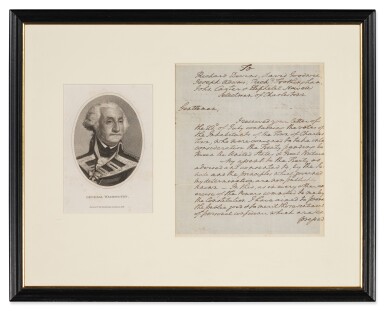Fine Manuscript and Printed Americana
Fine Manuscript and Printed Americana

Washington, George | The President defends the ratification of Jay's Treaty
Auction Closed
January 29, 07:18 PM GMT
Estimate
30,000 - 40,000 USD
Lot Details
Description
Washington, George
Autograph letter signed ("Go: Washington") as first President, to the Selectmen of Charlestown, Massachusetts, defending his approbation of Jay's Treaty
1 1/4 pages (216 x 185 mm, sight) on a sheet of light-blue tinted laid paper with Washington's personalized watermark), "United States" [Philadelphia], 31 August 1795, directed "To Richard Devins, David Goodwin, Joseph Adams, Richd. Frothingham, John Carter & Eliphelet Newell Selectmen of Charlestown." Framed and double-glazed with Plexiglas with an engraved portrait of Washington and a typed transcription of the letter, by Goodspeed's Book Shop, Boston, 1982.
"In this as in every other exercise of the powers committed to me by the Constitution I have aimed to promote the public good. …"
John Jay was sent to London in 1794 as U.S. Envoy Extraordinary to attempt to settle issues unresolved with Great Britain since the Treaty of Paris, particularly high British tariffs and British interference with American shipping. As Washington explained to the Senate when nominating Jay as envoy, "My confidence in our Minister plenipotentiary in London continues undiminished. But a mission, like this, while it corresponds with the solemnity of the occasion, will announce to the world a solicitude for a friendly adjustment of our complaints, and a reluctance to hostility. Going immediately from the United States, such an envoy will carry with him a full knowledge of the existing temper and sensibility of our Country; and will thus be taught to vindicate our rights with firmness, and to cultivate peace with sincerity." The result of Jay’s embassy was his eponymous treaty, which obtained the surrender by the British of the northwestern forts (already agreed to in 1783) and a commercial treaty with Great Britain that granted the United States "most favored nation" status. But most points of contention were left unresolved and led, eventually, to the War of 1812. The treaty, which was approved in the Senate by a single vote, was deeply unpopular. Jay himself supposedly quipped that he could travel from Philadelphia to Boston by the light of his burning effigies.
One of many jurisdictions that objected to the Treaty was Charlestown, Massachusetts, which, in a town meeting held 22 July 1795 voted its disapproval of the Treaty by a margin reported in (and likely exaggerated by) the Boston Independent Chronicle: and the Universal Advertiser of one hundred and fifty to eight. At the meeting, it was also voted that these results be conveyed to President Washington, and Selectmen Devens, Goodwin, Adams, Frothingham, Carter, and Newell prepared their report that same evening. In conveying the tally of the vote to Washington, the Selectmen—all veterans of the Revolution in either the Massachusetts Militia or Continental Army—assured him that they were “fully persuaded that every sentiment of your heart with every Action of your life is directed toward the public good.”
Washington here graciously replies in kind: "I received your letter of the 22d. of July containing the votes of the Inhabitants of the Town of Charles Town, who were convened to take into consideration the Treaty pending between the United States & Great Britain.
"My assent to the Treaty as advised and consented to, by the Senate and the principles which governed my determination are now publickly known.—In this as in every other exercise of the powers committed to me by the Constitution I have aimed to promote the public good & to merit those sentiments of personal confidence which are expressed in your communication." Washington's response was printed in the Boston Columbian Centinel of 12 September 1795.
REFERENCES
For the Selectmen's letter to Washington, see The Papers of George Washington, Presidential Series, ed. Ebel, 18:401–403. The text of a draft of Washington's reply (which omits the first paragraph of the letter as sent) is given as footnote 3 in this entry.
